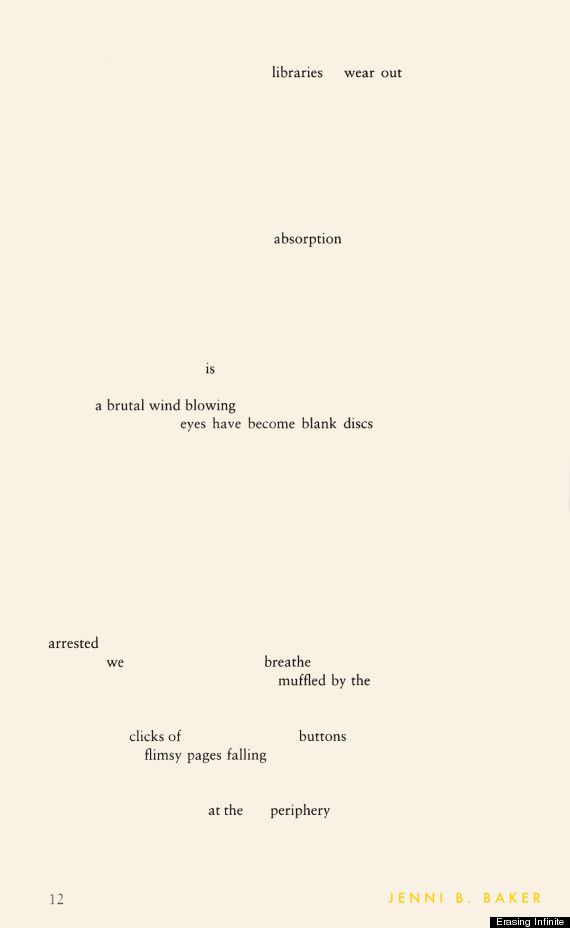We are all erased.
All lives end eventually, whether at the hands of time or illness, intention or accident. What's left in their stead, however, is never a complete absence. Family, friends and colleagues weave new stories from memories and mementos -- stories that say not just who the departed were, but who they were to those who knew them, stories that hold in spite of the gaps.
This appropriation plays out literally in the act of erasure poetry -- the art of marking out words and phrases from an existing text, leaving behind select words that compose a new poem. Poets start with the stories others have left behind, poring over their turns of phrase, character structure and plots, excising pieces to remember and respond to.
In late 2013, I started work on Erasing Infinite, a project in which I create erasure poetry page by page from David Foster Wallace's Infinite Jest. The effort springs not from fandom, but from grief, my creative process at once a metaphor for death and a mechanism for dealing with it.

Like the many followers of Wallace's work I've come to know personally over the past year, I rarely see myself reflected in the books I read. In addition to pursuing an unconventional life path, I think and feel too much to find too much common ground with novels' usual protagonists and plots. Wallace was one of the few writers to truly understand that (borrowing his words) "fiction's about what it is to be a fucking human being." Infinite Jest is human-beingness writ large, a novel of anxiety, history, influence, humor and a lot of heart. I feel Wallace's loss acutely.
As a practitioner of erasure poetry, I approach texts with an eye towards excerpting and recombining words and phrases in a manner that reacts to or reinterprets the original. It's natural that I would turn this creative lens towards Infinite Jest, a novel of enormous feeling, in order to process my own enormous feelings over its author's death. Poetry, too, is about expressing basic human truths.
My technical process never changes. I use a scanner to create digital images of the pages, then transfer them to my computer where I use Photoshop to correct any deficiencies in the scan. I proceed to erase the text digitally -- employing the paintbrush tool to apply virtual paint to the page in the same cream color of the page itself, obscuring all text except the words and phrases composing the final piece.
My conceptual process varies widely. Writers who create under constraints can attest to the liberty that comes in breaking free from the shackles of one's own worldview and word bank. Starting with another's work can give rise to greater personal expression than can often be arrived at by creating completely from scratch.
It's within the stories and sentiments of Wallace's teenage tennis players, recovering drug addicts and wheelchair assassins that I've been most fully able to articulate my own. At the center of both Infinite Jest and my own work are those same human truths: confidence and worry, loneliness and companionship,.
When I'm lucky, I'll immediately spot a compelling combination of words -- usually a turn of phrase or recurring strain -- and search the sections of the page above and below to locate complementary text. Other times, I find freedom in additional constraint, limiting myself to words that align along one margin or that fall within a specific horizontal inch on the page. I can stare at a page for two hours and spot nothing, come back to it the next day and craft a poem within ten minutes. Occasionally, things get strange.
Regardless of the technical and conceptual routes, the end point is always the same: the Erasing Infinite poems represent a conversation with Wallace that I get to have beyond the grave. This project, continued over the next five years, represents a measured approach to grief that feels at once manageable and productive.
"It's weird to feel like you miss someone you're not even sure you know," Wallace writes mid-novel. It's weird to feel like I miss an author I knew only through his words, strange to carry this compulsion to honor him and mark his loss. Erasing Infinite is my attempt to work through these sentiments and create something in his absence does justice to not just Wallace, but the common human threads that unite us all.
Below are seven poems from the Erasing Infinite Project






